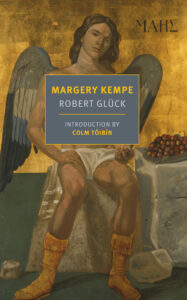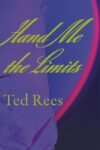
[New York Review of Books; 2020]
In Margery Kempe, fourteenth century England serves as the setting of Robert Glück’s writing of desire. His 1994 novel hijacks the story of the “failed Saint” and Christian mystic, Margery Kempe (who is sometimes credited with having written the first autobiography in the English language), for his own purposes of expanding the bounds of what can be said and done in fiction. This combination — the very oldest and the very newest — recalls other devices used by writers associated with the New Narrative, the San-Francisco based group which centered around Glück’s writing workshop, at Small Press Traffic. Dodie Bellamy, for example, would draw blood from Bram Stoker’s Dracula to create her own revitalized text, The Letters of Mina Harker (published in 2004 and currently being held hostage by the University of Wisconsin Press)and Kathy Acker was drawn, similarly, to old novels, appropriating both Don Quixote and Great Expectations for texts of her own.
One of the common threads of these works is the intensity and immediacy with which they are able to convey sexual desire in, and through, their avatar-texts. But what remains a puzzle is why articulating desire becomes more, rather than less possible, with so much antiquated language floating around. (We might call the bits of language that these texts supply, after Susan Stewart, “distressed” language, that is, language which shows some sign of obsolescence.) Why are the writers of the New Narrative interested in old words?
Glück’s Margery provides a partial answer. In many ways, historical language is the best kind of language for abject desire. When you’re as in love as the “writers who love too much” are, its crucial to temporize, to bide your time while you give the person you’re obsessed with time to make his or her decision to be with you or not. For Glück, the story, vocabulary, and mise en scène of Margery Kempe resources him with the features he needs for a sort of writerly Maneuver X. Maneuver X is when you try to feign disinterest by not texting him back for a week. Instead, you’re like, I’m busy with all my
clerks, priests, and squires, and . . . chicken broth thickened with pounded almonds and flavored with cloves, coriander, and thyme . . . black pudding and sausage; lampreys and herring, meat potatoes; and . . . local shrimp whose flavour was surprisingly full-bodied.
In Margery Kempe, these indexes are not just the authenticating niceties of historical fiction. They are, in Glück’s hands, an active principle of delay, a means of disappearing while the reader makes his or her decision to be with Bob or not. Maneuver X (I’ve ripped this from a character in Whit Stillman’s Barcelona, who calls Maneuver X “removing all pressure” and says its different from merely playing hard to get)is a double strategy: it gives the reader space but it also gives Bob something to do, something to be charmed by while he bides his time. These historical details are the wheelhouse of the novel, supplying material for the short, declarative sentences that Glück writes about “stacking up” in Margery Kempe. Each bears a trace of this effort to be interested in something other than “L,” Bob’s fickle love interest. We could also call that strategy “Margery,” or “research.”
After all, what are “quince preserves”? And what are they doing for a writer who is concerned with all that is new, immediate, and erotic in fiction? I would argue that the mention of things like quince preserves does not detract from the emotional situation at hand (his love for L), but, rather, holds it off, delays it, and is therefore always in reference to Bob’s desire.Glück keeps them because he knows the referent of quince preserves is L, not the historical scene. This tactic, the uniting of the writer’s craft with Maneuver X, produces the special kind of formalism of the New Narrative. By dint of this formalism, an erotic circuit is opened up. Weallfeel closer to Bob, via Margery, because, as besotted lovers are always pointing out, being the object of someone’s manipulation can signal love: after all, he chose to manipulate me, and not somebody else.
In some ways, the style of this novel resembles the terse, declarative expository prose that is taught as best practice in some MFA programs. Here, however, the accumulation of detail does not lend Glück’s text a neutral perspective. Instead, every detail is fused with, and compromised by, the desire which spans over the entire observational field. Glück uses the form of the declarative sentence towards an end of lyricism and excess. The authenticating detail, paradoxically, suffuses the writing with the hyper-personal, rather than giving it objectivity. Each birdcall, each grebe arriving at just the right season, presences desire for L, precisely by trying to populate the text with that which does not reference him. These terms are all circulating in a paragraph taken from the first section:
Another mile and the road divided. The landscape is my longing materialized; there is no more world; the sentence that describes landscape, clothes, and food goes nowhere — it’s already aroused, a heaven where L and I are making love. My lyricism is my tenderness for L.
Lyricism means going nowhere. That is not the traditional account of lyrical prose, which would rather have it be about erotic consummation than erotic gridlock. The “historical drag” (as Glück calls it) is not perpetual orgasm (despite the vivid depictions of sex in Glück’s novel). Rather, the lyricism is the agony of a false repose, or muted desire. The gestures associated with it are biting one’s lip, weeping openly, and waiting by the phone. (When else would you bother to look up when a grebe comes to town, or what fruits were stored as preserves in medieval Norfolk?)
Glück is clearly thinking about what these sentences, which “go nowhere,” do vis à vis Bob’s desire for his relationship to have a narrative progression. He ultimately gives L an ultimatum: “We’ve been dating for three years. Let’s live together or breakup.” Is historical detail a tactic for stalling? Weirdly enough, this aspect of the book’s formalism could also be called historicism. Regardless of what you choose to call it, grebes and quince preserves represent, above all, a repertoire for generating sentences, a language technology, and an image bank for thinking about something not-L, that is to say, disinterestedly.
Nonetheless, there is a casual, down-to-earth register that suffuses this effort. Take the descriptions of Margery’s trip to Jerusalem. Language slips from the Bob/L affair, to the Margery/Jesus affair. At moments, it feels as though one narrative level is a commentary on the other. Put differently, it is easy to think that a novel like this one would get mileage from trespassing on the sacred. One level, this reading would go, would be a trespass on other; the modern, homosexual romance of Bob and L hijacks the “purer” story of Margery’s devotion to Jesus. Of course, anyone who has studied Christian mysticism knows that its imagery is already incredibly physical, and, indeed, the textual pleasure from this novel isn’t really the result of a juxtaposition of the sacred and the profane.
Though phrases like “Jesus’s cock” (which might, for a certain kind of reader, cause titters) are the most lurid examples of this possibility, it is not overplayed in the novel, and it is not, consequently, its greatest source of textual fun. More often than not, Glück savors gentler meetings of modern idiom with his historical source, as when two women “took the liberty” of confirming Mary’s virginity; elsewhere we are presented with Margery wearing “a clouted coat cut short to the knee.” Here, the subtly moderne notion of the “cut” is imposed on a past with no place for it. Or is there? By a similar process, our whole way of writing (Glück is especially interested in sentences which characterize in a jiff) is made strange. Part of what makes Margery Kempe stunning is the economy with which it achieves this refreshment of language:
Margery impressed Jesus who in turn motivated her. She challenged a monk in high office in Canterbury. “Sir, I accuse you of lechery, despair, and keeping worldly goods.” She was assertive, credible.
This is not a historical scene lifted into a modern idiom. Or, if it is, that is not what it mainly is. More radically, each sentence asks us to think whether such things can be said about historical personages, whether our sentence-structures, with their attendant ways of characterizing, apply. Such deceptively simple descriptions force us to wonder how much is historical about our way of thinking through characters. Can Jesus be “impressed”? Can Margery Kempe be those adjectives, “assertive, credible”? By eschewing the dross of historical language, historicity is cast on our own language, pooping it out at the other end with the force of simple declarations, like this one:
Pilgrims bought tours of the Holy Lands from ship captains stationed in Venice who negotiated package deals with the Saracens.
In the phrase “package deals with the Saracens” Glück’s special sense of anachronism refreshes the language by a double process. It borrows the foreignness of the fourteenth century subject to brush the dust off our own “package deals,” and, at the same time, it gives us back “Saracens,” a word which would otherwise be relegated to Masterpiece Theatre.
The same goes for the phrase: “the pilgrims were in high spirits,” and, at the end of their pilgrimage, “the round-trip had taken eleven weeks.” The text often darts in the direction of the historical, but does so only to affront the rehearsal of historical authenticity characteristic of historical fiction. Part of this trespass is to leverage one mode of narration against another. Take this sentence, for example:
Margery had not founded an order like St Bridget or promoted church reform like St. Catherine.
The voice is a recognizably internal one. It is Margery thinking through her personal failures. We instantly perceive it as a modern way of characterizing a heroine, of engendering sympathy by showcasing her lack of self-confidence. It is weird, though, that it is the same moment that would establish historicity. Here, two voices, or ambitions, are united, and in their union each intention is tacitly undermined: the need of the author to tout historical facts, and the need of the author to characterize his characters internally. The key, though, is the in-earnestness of the voice, otherwise the whole act falls apart. It is the same sangfroid that allows for the description of God as “one of the greatest religious leaders” without it being immediately put down to profanation.
This faux-naïve quality characterizes the best of Glück’s work, and that of some of his students, like the late writer Kevin Killian. In both, an excessive abundance of good faith renders possible gestures that other writers would not get away with. It allows these writers, keenly attuned to the writer’s craft, to slip between registers, and to take recourse to an expanded range of language effects than a so-called “literary” writer, always on guard against cliché, would allow herself.
Is this beatification? Why is it, that phrases like “Jesus’s cock” no longer can be experienced as a profanation? Because (and this is what I love most about Glück’s writing) the reader is gradually inclined to forget that there is a literary hierarchy altogether. Eric Auerbach’s idea of the stiltrennung, or, “separation of styles” is premised on the division between the sacred and the profane, and it just does not apply here. Glück’s literary effects are staked on a playfulness that far exceeds the pleasures of high-low. There are confusions (“the tension between masculine-feminine and inside-outside pervades all levels of my community”), there are slippages (“the real past under the official one”), and, yes, there is “literary drag,” but none of what Glück achieves can be put down to the pleasure of profanation.
Part of that literary drag is the de-centering of the authorial voice altogether. The writerly presence is teased, “made flesh,” when Glück writes, for example, that “Joseph wore a peaked turban to emphasize the oriental locale.” Moments before this sentence, Margery offers Jesus a nipple, to “amplify the theme of breast-feeding.” These playful sentences, where the intentions of the author become the intention of the characters, are not merely coy gestures of self-awareness. Instead, they alert us to the utter instability of narrative levels, of codes, and of characters that the novel plays on throughout.
In Glück’s treatment of the historical setting, the distinction that makes profanation possible (the sacred and the pornographic) destroyed while other kinds of juxtapositions are upheld. Pleasure cannot be obtained as prurient interest. Instead, our pleasure is like that of Margery, who spends her days waiting for the erotic plenitude of Christ’s physical return: non-stop, non-restricted to particular body-zones, textual. Or it is like Bob’s pleasure: clarified by abjection, reminding us of past pleasures, helping us to pass the days until He returns to us . . .
Will Hall is an American writer based in London. He is also a PhD student finishing up a dissertation on queer prose writing in the late nineteenth century. His poetry has appeared recently in Mirage #5/Period(ical), Tears in the Fence, and Molly Bloom.
This post may contain affiliate links.







